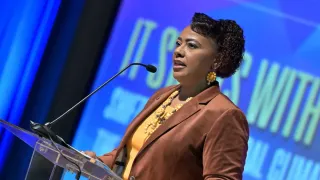
4 hours ago
Philadelphia to Open Historic Pride Visitors Center Ahead of U.S. 250th Anniversary Celebrations
READ TIME: 3 MIN.
Philadelphia is set to make history in January 2026 with the grand opening of the Philly Pride Visitor Center at 12th and Locust streets in the heart of the city’s Gayborhood. The initiative, orchestrated by the Philadelphia Visitor Center and Visit Philadelphia, is designed to coincide with a landmark year featuring the 250th anniversary of the signing of the Declaration of Independence, as well as global sporting events such as the FIFA World Cup and the MLB All-Star Game. The center will serve as both a practical resource for travelers and a testament to the city’s legacy of LGBTQ+ activism and resilience .
At its core, the Philly Pride Visitor Center aims to offer more than just travel advice and ticketing. It will feature curated exhibits showcasing Philadelphia’s pivotal role in queer history, including the first LGBTQ+ sit-in at Dewey’s restaurant in 1965 and the Annual Reminders demonstrations outside Independence Hall from 1965 to 1969. These events are recognized as foundational moments in the national LGBTQ+ rights movement, preceding the Stonewall riots and setting a precedent for activism and representation .
The historical content of the center has been developed in partnership with local activists and historians, notably Mark Segal, founder of Philadelphia Gay News. Segal emphasized the city’s enduring legacy in a statement: “Our city helped launch the fight for representation in media, shaped national policy, and created safe, visible spaces for our community. Now, with the opening of the Philly Pride Visitor Center, Philadelphia proudly honors that legacy and reaffirms its commitment to those who call this community home” .
The establishment of the Pride Visitor Center reflects Philadelphia’s commitment to welcoming all travelers, especially those seeking affirming spaces and community connection. The center will provide itinerary planning, access to tickets for local events, and travel advice tailored to LGBTQ+ visitors. In addition, the center will offer souvenirs sourced from queer-owned businesses, serving as a showcase for local entrepreneurship and creative talent .
Organizers expect the center to be a focal point during Pride Weekend and other major celebrations, acting as an anchor for visitors attending festivities in the city’s vibrant Gayborhood. The center will also support outreach to international guests arriving for the World Cup and MLB All-Star Game, ensuring that Philadelphia’s message of inclusion is broadcast globally .
Philadelphia’s LGBTQ+ history is deeply interwoven with the broader narrative of American civil rights. The city was the site of the first organized LGBTQ+ protest in the United States, the Dewey’s sit-in, where activists challenged discriminatory policies against gender-nonconforming and transgender people. The Annual Reminders, held outside Independence Hall between 1965 and 1969, brought attention to the lack of civil rights for sexual minorities and laid the groundwork for the national movement that would follow .
The Pride Visitor Center’s exhibits will illuminate these stories, connecting local activism to national milestones such as the Stonewall riots and the eventual recognition of LGBTQ+ rights in law and culture. By situating these narratives within the context of the U.S. 250th anniversary, the center underscores the importance of LGBTQ+ inclusion in the ongoing pursuit of equality and freedom.
The success of the Pride Visitor Center is rooted in community collaboration. Planners worked closely with Philadelphia’s diverse LGBTQ+ organizations, business owners, and cultural leaders to ensure the center reflects the needs and aspirations of those it aims to serve. The project benefited from extensive public feedback, resulting in a space that is accessible, affirming, and educational for all visitors .
The center’s opening is expected to boost local tourism, draw attention to LGBTQ+-owned enterprises, and foster greater understanding of the city’s progressive history. Philadelphia’s reputation as an inclusive destination is poised to grow, setting a standard for other cities seeking to celebrate and support their LGBTQ+ communities.
As Philadelphia prepares for an influx of visitors during the nation’s semiquincentennial, the Philly Pride Visitor Center stands as both a celebration of past achievements and a commitment to ongoing advocacy. With major international and national events on the horizon, the center will be instrumental in introducing guests to the city’s welcoming spirit and rich queer heritage.
The project aligns with Philadelphia’s broader efforts to promote diversity, equity, and inclusion across public spaces and cultural institutions. City officials, tourism agencies, and community leaders hope that the Pride Visitor Center will serve as a model for other cities, demonstrating the value of investing in LGBTQ+ infrastructure and storytelling .
The establishment of the Philly Pride Visitor Center marks a significant step forward for Philadelphia’s LGBTQ+ community and for the city’s commitment to commemorating the full spectrum of American history. As the United States celebrates its 250th anniversary, the center offers an opportunity to honor the struggles and triumphs of queer people, amplify their stories, and ensure that future generations have access to the resources and representation they deserve.






